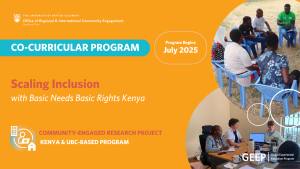
This program is part of the Global Experiential Education Program (GEEP) and is informed by ORICE values. GEEP aims to strengthen the bridge between classroom learning (theory) and application (practice) to address pressing global issues, in this community-based praxis initiative. Students who participate in GEEP can participate in experiential education projects designed and led by global community partners.
Details at a Glance
Application Deadline: September 14th, 2025 (11:59PM)
- Program Type: Co-curricular (Not-for-credit)
- Engagementship Type: Community-Engaged Research Project in collaboration with Maisha Girls Safe House
- Engagementship Location: 2025W In-person, UBC-Based
- Duration: 4 months starting in September 2025
- Eligibility: Open to UBC-V Undergraduate (60+ credits) & Graduate students (more details below)
Project Description
Organization Details
Maisha Girls Safe House (MGSH) is a grassroots Non-Governmental Organization committed to reaching out, receiving, and protecting girls from sexual violence and human trafficking. They provide a continuum of care and support while fostering resiliency for a better quality of life.
Maisha runs a safe house that temporarily hosts and supports girl survivors of sexual exploitation and abuse under 19 years of age, as well as community-based safe spaces targeting girls and young women vulnerable to human trafficking and sexual exploitation.
Since its inception, MGSH has supported more than 700 girl survivors, meeting their essential needs, providing healthcare, trauma healing, and guiding them through the justice system. Afterward, they carry out family tracing, reconciliation, and reintegration processes. Additionally, MGSH is a strong advocate against Sexual Gender-Based Violence (SGBV) and collaborates with various stakeholders to promote interventions aimed at addressing SGBV.
Current Project
By design, Maisha Safe House is intended to provide temporary housing for girls proceeding through the justice system. Assisting girls to transition into the safe house following traumatic events requires care, and while the Maisha team regularly navigates this process, they are continuously developing approaches and processes to ease the integration experience for all involved. However, the safe house is not intended to be a long-term or permanent housing; and supporting girls to reintegrate into the community and alternative housing post-justice system can be challenging.
Maisha Safe House is partnering with ORICE for this desk research project to identify good/innovative practices for (re)integration into and out of safe houses in comparable environments to Nairobi, Kenya. Maisha is also interested in learning about assessments that have been completed and the criteria that were used to make such assessments regarding (re)integrations. This first stage will be presented in a final presentation and a written report, after which the Maisha team will decide whether and how to utilize it in programming and/or research.
Students joining the 4-month engagementship (September -December 2025) will have an opportunity to work with Maisha Safe House to deliver research to inform their (re)integration practices for girls accessing their safe house. Activities associated with this project will include meeting with Maisha Safe House staff to gather a stronger understanding of what kind of information they hope to learn about and why; undertake desk research using academic journals and grey literature about the research themes; develop a comparative case study of 3-4 safe houses in agreed upon regions- with particular attention to assessment methods. All materials will be delivered to the Maisha team in the form of a presentation and written report.
Project Timeline
Over a period from September 2025 to December 2025, the selected team of students will spend 3-5 hours weekly working collaboratively to complete the project. Students will be asked to participate in weekly scheduled in-person meetings (on the UBC Vancouver Campus) to ensure collaboration and accountability goals are defined and met. However, the remainder of the allotted time will be self-directed or in small work teams as per agreements with teammates.
More Information
Application Deadline: September 14th, 2025 (11:59pm)
- Review project details (please contact ubc.orice@ubc.ca with any questions you may have).
- Next, fill out the ORICE program application form (Qualtrics Survey) below.
- Successful applicants will be invited by email for a 20-minute individual interview.
- After interviews, you will be notified of a decision; successful candidates will be sent an offer letter with further details on the program and detailed instructions on how to accept. Your selection into the program includes meeting eligibility requirements, as well as your initial application and your performance in the interview. The team will ultimately be comprised of 4-6 students.
- Be an undergraduate (domestic or international) at the UBC Vancouver campus with 60 or more completed credits, or a graduate student as of August 31st, 2025.
- Have access to a reliable internet connection and computer to collaborate with peers, ORICE staff and international partners to attend meetings remotely if online meetings are required.
- Demonstrate the ability to think critically and creatively and be willing to take responsibility and initiative to meet project deliverables.
- Prior experience with comparative case research, best practice review or familiarity with the sensitivities surrounding vulnerable women and girls is an asset, but not necessary.
- Willingness to have occasional meetings that accommodate time zone considerations for guests joining from Kenya or elsewhere.
Project Dates: September 2025 - Dec 2025
Weekly Meetings (Sept - Dec): TBD - applicants will be asked to be flexible as we will be seeking a weekly standing 2-hour meeting block during M-F, 9 am - 5 pm.
Note: Team members need to be available for occasional meetings with the community partner at 8 am due to time zone differences.
| Timeline | |
|---|---|
| Applications Open | August 18, 2025 |
| Deadline | September 14, 2025 @ 11:59pm. |
| Short Interviews | September 17 - 24, 2025 |
| Offers Made by | September 26, 2025 |
| Acceptances Due | September 29, 2025 |
| First Meeting | To be scheduled between October 1 - 10 |
Funding available for this program: ORICE Experiential Education Accessibility Award.
Note: Students may only hold one award at a given time. Please visit our funding page for more information.



